CAA News Today
Conference Submissions for CAA 2018
posted by admin — April 07, 2017
Projects and Proposal Deadlines April 17 and 24
The Annual Conference Committee invites proposals of interest to its members and varied audiences. Submissions that cover the breadth of current thought and research in art and art practice, art and architectural history, theory and criticism, studio art, pedagogical issues, museum and curatorial practice, conservation, design, new media, and developments in technology are encouraged.
To submit a proposal, individuals must be current CAA members. All session participants, including presenters, chairs, moderators, and discussants, must also be current individual CAA members. Please have your CAA Member ID handy as well as the member IDs of any and all participants as this is a required field on the submission form. Please note that institutional member IDs cannot be used to submit proposals. If you are not a current individual member, please renew your membership or join CAA.
All session participants must also register for the conference. Online registration for CAA 2018 will begin October 2, 2017. Early conference registration will end December 15, 2017 and advance conference registration will end on February 7, 2018. Early and advance conference registration fees will not change from CAA 2017, New York.
The Annual Conference Committee will accept the following proposals for review: Complete Sessions, Sessions Soliciting Contributors, and Individual Paper/Project proposals. All sessions will be 90 minutes in length at CAA 2018. Please plan accordingly. For full details on the submission process for the conference, please review the information below and on the individual submission pages.
PROPOSAL SUBMISSION TYPES
Session Soliciting Contributors
SUBMISSION DEADLINE: April 17, 2017
The Session Soliciting Contributors option allows a submission for a full session (90 minutes in length) with yet-to-be identified speakers and papers/projects. If selected, such sessions will be included in the call for participation (CFP) which opens June 30.
Individual Paper/Project
SUBMISSION DEADLINE: April 17, 2017
Individual Paper/Project proposals (15 minutes in presentation length) may be submitted for review. No specific theme is required. The Annual Conference Committee will review and select paper/project proposals based on merit and group approved submissions into Composed Sessions of up to four participants. A liaison from the Annual Conference Committee will be identified for each Composed Session to assist with the format and to help identify a session chair or moderator.
Complete Session
SUBMISSION DEADLINE: April 24, 2017
The Complete Session option allows a submission for a complete panel (90 minutes in length) pre-formed with participants and papers/projects chosen in advance by session chairs. This session requires advance planning and information gathering by the chair(s).
Affiliated Societies
SUBMISSION DEADLINE: April 24, 2017
Each Affiliated Society may submit either one Complete Session proposal (90 minutes in length) pre-formed with participants and papers/projects chosen in advance or one Session Soliciting Contributors proposal (90 minutes in length) to be included in the CFP which opens June 30. A note of approval from the Affiliated Society chair must accompany the submission. This session will be guaranteed and will be identified as an Affiliated Society session in all CAA publications.
Subsequent proposals by Affiliated Society members may be submitted separately by individuals, but are subject to peer review by the Annual Conference Committee and must be submitted via the Complete Session, Session Soliciting Contributors, or Individual Paper/Project submissions forms described above. These submissions are not guaranteed and, if selected, will not be labeled or identified as Affiliated Society sessions in CAA publications.
CAA PIPS Committees
SUBMISSION DEADLINE: April 24, 2017
CAA PIPS committees may submit either one Complete Session proposal (90 minutes in length) pre-formed with participants and papers/projects chosen in advance or one Session Soliciting Contributors proposal (90 minutes in length) to be included in the CFP which opens June 30. A note of approval from the committee chair must accompany the submission. This session will be identified as a committee session in all CAA publications.
Subsequent proposals by committee members may be submitted separately by individuals, but are subject to peer review by the Annual Conference Committee and must be submitted via the Complete Session, Session Soliciting Contributors, or Individual Paper/Project submissions forms described above. These submissions are not guaranteed and, if selected, will not be labeled or identified as committee sessions in CAA publications.
GENERAL SUBMISSION GUIDELINES
- All sessions will be 90 minutes in length at CAA 2018. Please plan accordingly.
- All session proposals must be completed and submitted online.
- To submit a proposal, individuals must be current CAA members. All session participants, including presenters, chairs, moderators, and discussants, must also be current individual CAA members. Please have your CAA Member ID handy as well as the member IDs of any and all participants as this is a required field on the submission form. Please note that institutional member IDs cannot be used to submit proposals. If you are not a current member, please renew your membership or join CAA.
- All session participants must also register for the conference. Online registration for CAA 2018 will begin October 2, 2017. Early conference registration will end December 15, 2017 and advance conference registration will end on February 7, 2018. Early and advance conference registration fees will not change from CAA 2017, New York.
- CVs are required for panel proposals where the chair and, if applicable, the co-chair are known.
- Session and paper/project abstracts should be no more than 250 words in length.
- The accuracy of information entered into the proposal form (e.g. spelling of names, affiliations, titles) is important as it will be pulled directly from this database for conference publications such as Abstracts 2018 and the conference website.
- The Annual Conference Committee makes its selections solely on the basis of merit and works to create a balanced program. Where proposals overlap, CAA reserves the right to select the most considered version or, in some cases, to suggest a fusion of two or more versions from among the proposals submitted.
- If their proposals are accepted, CAA members may participate in session panels in consecutive years.
- For more information about session proposals for the 2018 Annual Conference, please contact Katie Apsey, CAA manager of programs, at 212-392-4405 or Tiffany Dugan, CAA director of programs, at 212-392-4410.
KEY DATES
- February 27 – Call for Annual Conference session and paper/projects proposals begins
- Proposal Submission Deadlines for CAA 2018:
-
- April 17 – Proposal submission deadline for Sessions Soliciting Contributors
- April 17 – Proposal submission deadline for Individual Paper/Projects
- April 24 – Proposal submission deadline for Complete Sessions
- April 24 – Proposal submission deadline for Affiliated Societies and CAA PIPS Committees
- May 15 – Call for Professional Development Workshop Proposals begins
- June 19 – Notifications sent regarding approved sessions for CAA 2018
- Key dates for approved Sessions Soliciting Contributors included in the Call for Participation (CFP):
-
- June 30 – CFP for approved Sessions Soliciting Contributors announced (includes Poster Sessions)
- August 14 – Paper/Project submission deadline to chairs of Sessions Soliciting Contributors; deadline for Poster Session submissions
- August 28 – Session chairs send notifications to participants selected from CFP; Poster Session notifications sent
- September 18 – Deadline for all chairs to submit final abstracts and website listings to CAA
- October 2 – Online conference registration opens
- December 15 – Early conference registration closes
- February 7 – Advance conference registration closes
CAA Seeks Ad Sales Rep
posted by admin — March 08, 2017
Part-time and commission based
The College Art Association (CAA), a membership and advocacy organization for those working in the visual arts, seeks a part-time advertising sales rep with media sales experience in both print and digital platforms. The ideal candidate should have established contacts in the arts and culture publishing landscape and in the wider culture field. She/he will have the mindset to strategically target prospective clients to build relationships that support CAA’s prestigious publications and events with a strong ad sales program.
The advertising sales rep would work primarily on CAA’s two flagship print journals, The Art Bulletin and Art Journal, with some work on CAA’s digital reviews platform, caa.reviews. Additional work would include selling ads for the graduate program directories and the CAA Annual Conference. Candidates for the position should have experience in billing clients, advertising proposal creation, and proper tracking of invoices and payments.
This is a part-time, commissioned-based position. The position reports to the Director of Communications and Marketing.
DUTIES AND RESPONSIBILITIES
- Manage relationships with current advertising clients and develop strategy for new client growth
- Work closely with staff across all departments to create client strategy aligned with journals, website content, and programs
- Produce client contracts for ad sales
- Oversee invoicing and record keeping for ad sales on journals and relevant websites
- Report and present on ad sales program and results to staff members and constituents
- Work with publications department staff and in-house graphic designer on ad placement and design as needed
- Other duties as assigned or requested
QUALIFICATIONS
- At least 2 years of ad sales or comparable experience
- A warm and welcoming personality that encourages relationship building
- Established relationships with advertisers and companies in the arts and culture field
- Proven track record of closing new business and maintaining current business
- Exceptional written/verbal communication skills
- Ability to work independently, organize multiple concurrent tasks, work efficiently, and follow through on details
- Experience with spreadsheets, systems, and database management and generally accepted programs and office equipment required
- BS/BA degree or equivalent preferred
Send resume and cover letter to nobourn@collegeart.org with the subject line “CAA Ad Sales Rep.”
This job description is intended as a summary of the primary responsibilities of and qualifications for this position. The job description is not intended as inclusive of all duties an individual in this position might be asked to perform or of all qualifications that may be required either now or in the future.
The College Art Association is an equal opportunity employer and considers all candidates for employment regardless of race, color, sex, age, national origin, creed, disability, marital status, sexual orientation, gender expression, or political affiliation.
New in caa.reviews
posted by admin — March 03, 2017
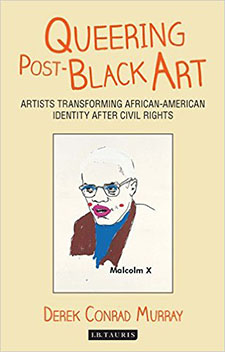 Michele Prettyman Beverly reads Queering Post-Black Art: Artists Transforming African-American Identity after Civil Rights by Derek Conrad Murray. The volume “amounts to the most comprehensive (and engaging) post-black theoretical methodology to date,” offering a new level of “critical rigor and innovative thinking” and “highlighting the intersection of black queer and sexual identities.” Read the full review at caa.reviews.
Michele Prettyman Beverly reads Queering Post-Black Art: Artists Transforming African-American Identity after Civil Rights by Derek Conrad Murray. The volume “amounts to the most comprehensive (and engaging) post-black theoretical methodology to date,” offering a new level of “critical rigor and innovative thinking” and “highlighting the intersection of black queer and sexual identities.” Read the full review at caa.reviews.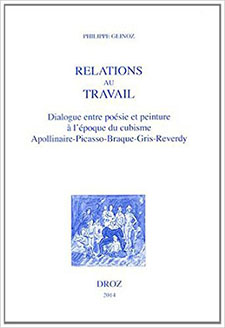 Charles Palermo reviews Philippe Geinoz’s Relations au travail: Dialogue entre poésie et peinture à l’époque du cubism: Apollinaire-Picasso-Braque-Gris-Reverdy. Among the literary genre of these– or habilitation-turned books, it “is among the very best,” “filled with close readings, wide-ranging and thoughtful use of existing literature, and a framework of pertinent intellectual-historical context.” Read the full review at caa.reviews.
Charles Palermo reviews Philippe Geinoz’s Relations au travail: Dialogue entre poésie et peinture à l’époque du cubism: Apollinaire-Picasso-Braque-Gris-Reverdy. Among the literary genre of these– or habilitation-turned books, it “is among the very best,” “filled with close readings, wide-ranging and thoughtful use of existing literature, and a framework of pertinent intellectual-historical context.” Read the full review at caa.reviews.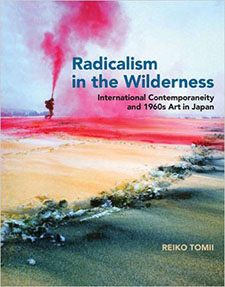 John Clark reviews Radicalism in the Wilderness: International Contemporaneity and 1960s Art in Japan by Reiko Tomii. This “impeccably researched and well-written contribution” offers a “challenge to art history” by “understanding the way in which modernisms from the periphery within a cultural continuum coordinate with international and transnational tendencies to constitute contemporaneity.” Read the full review at caa.reviews.
John Clark reviews Radicalism in the Wilderness: International Contemporaneity and 1960s Art in Japan by Reiko Tomii. This “impeccably researched and well-written contribution” offers a “challenge to art history” by “understanding the way in which modernisms from the periphery within a cultural continuum coordinate with international and transnational tendencies to constitute contemporaneity.” Read the full review at caa.reviews.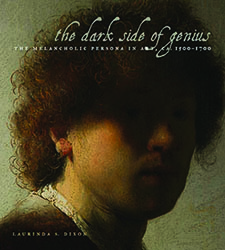 Stephanie S. Dickey discusses Laurinda S. Dixon’s The Dark Side of Genius: The Melancholic Persona in Art, ca. 1500–1700. “Much more than an iconographic or visual survey,” the book “presents a solidly researched, interdisciplinary synthesis of early modern thinking about melancholia as a medical and cultural condition,” blending “medical, literary, and art-historical learning and lore.” Read the full review at caa.reviews.
Stephanie S. Dickey discusses Laurinda S. Dixon’s The Dark Side of Genius: The Melancholic Persona in Art, ca. 1500–1700. “Much more than an iconographic or visual survey,” the book “presents a solidly researched, interdisciplinary synthesis of early modern thinking about melancholia as a medical and cultural condition,” blending “medical, literary, and art-historical learning and lore.” Read the full review at caa.reviews.CAA Arts and Humanities Advocacy Toolkit
posted by admin — March 02, 2017
“The phone calls and emails began coming in a few weeks ago to the Nebraska congressional delegation — all Republicans, and all potentially crucial to an expected fight over the very existence of the National Endowments for the Arts and the Humanities under President Trump.” –“How to Block Trump Arts Cuts? Groups Look for G.O.P. Help,” The New York Times, February 28, 2017
Arts and Humanities Advocates are already taking action. CAA encourages its members and all advocates of the arts and humanities to be persistent and do more.
On January 23, 2017, CAA released a statement condemning the proposed budget cuts to the National Endowment for the Arts and the National Endowment for the Humanities, among other federal agencies.
“For more than a century, the College Art Association (CAA) has represented art historians, artists, museum professionals, designers, and others who think and care about the visual arts and its impact on our culture. We do this in part through direct advocacy for artistic and academic freedom.
Like many other Americans, we have closely watched the proposed changes to the federal government. Recent news reports reveal that the US President intends to propose the elimination of funding for the National Endowment for the Arts (NEA) and the National Endowment for the Humanities (NEH). This proposal is reportedly based in part on a recommendation by the Heritage Foundation that states, ‘As the U.S. Congress struggles to balance the federal budget and end the decades-long spiral of deficit spending, few programs seem more worthy of outright elimination than the National Endowment for the Arts.’
We offer our complete and total opposition to these efforts.”
The current administration’s proposal to cut funding for the NEA and NEH is based on a 1997 Heritage Foundation report, titled “Ten Good Reasons to Eliminate Funding for the National Endowment for the Arts.”
To support our statement, CAA has put together an Arts and Humanities Advocacy Tool Kit to help our members and anyone who wants to advocate for the arts and humanities. Information is power, after all. The Tool Kit information is pulled from a variety of sources that aid in forging partnerships, obtaining accurate data on the impact of the arts and humanities, and actions one can take in order to use your voice effectively.
We encourage you to contact us at CAA also. CAA staff will attend both Arts Advocacy Day and Humanities Advocacy Day. The more stories we can share as we meet with colleagues and representatives, the more influence we collectively bring to the table.
Locate and Call
Call your representatives about any and all pressing issues.
Find your local representative
This is a helpful guide on how to contact your local representative:
The How-to Guide to Contacting your Local Official
Face-to-Face
Face-to-face meetings with representatives are the most effective way to deliver your message. Hand your representative a physical document with facts and figures and be sure to explain who you are and how the group you represent relates to your local politician’s constituency.
Town Halls are one good way to voice your opinion to your local representative in person. The Federation for American Immigration Reform has a guide on how to attend Town Hall meetings.
You can also organize and request an appointment at the offices of your representative. The National Priorities Project has a good guide to setting up office appointments.
Sign Petitions
There are myriad petitions floating around these days, addressing vast numbers of topics. It can be hard to keep track or know which petitions to sign.
Change.org remains one of the best places to find a database of petitions by topic. The site also provides explanations and background information for each petition.
To sign the petition to support the NEA and NEH you can sign the White House created petition, the Change.org petition, and the Arts Action Fund petition.
Advocates can also send postcards directly to members of Congress that are customized with their artwork or other artworks, thanks to the #savethearts Postcard Project.
Arm Thyself with Data and Information
There is lots of good data about the impact of the arts and humanities on people and places. The National Humanities Alliance is working on several data gathering and mapping projects.
Americans for the Arts is also a hub for data and information about various federal arts agencies and arts education in America.
Data on the arts and humanities can also be found on the National Endowment for the Arts Facts & Figures page and the National Endowment for the Humanities Impact Reports.
This nifty website is a running tally of all the programs that the NEA funded in 2016.
You can also search the NEA website to see all grants they have awarded since 1996. Check to see what organizations in your local area are funded by the NEA.
The same search for grants can be done on the NEH website.
CAA Seeks Publications Committee Member
posted by admin — February 28, 2017
CAA invites nominations and self-nominations for one member-at-large to serve on the Publications Committee for a three-year term, July 1, 2017–June 30, 2020.
The Publications Committee is a consultative body that meets three times a year. Through its chair, the CAA vice president for publications, the committee advises the CAA Publications Department staff and the CAA Board of Directors on publications projects and meets with chairs of the editorial boards of The Art Bulletin, Art Journal, and caa.reviews three times each year. The committee chooses candidates to serve on CAA’s book-grant juries; sponsors a practicum session at the Annual Conference; and, with the CAA vice president for publications, serves as liaison to the board, membership, editorial boards, book-grant juries, and other CAA committees.
Each year the committee meets twice in the spring and fall and once at the CAA Annual Conference in February. Members pay their travel and lodging expenses to attend the meeting at the conference. Meetings in the spring and fall are currently held by teleconference. Members of all committees volunteer their services to CAA without compensation.
Candidates must be current CAA members and should not serve concurrently on other CAA committees or editorial boards. Applicants may not be individuals who have served as members of a CAA editorial board within the past five years. Nominators should ascertain their nominee’s willingness to serve before submitting a name; self-nominations are also welcome. Appointments are made by the CAA president in consultation with the CAA vice president for publications.
Please send a letter of interest, a CV, and your contact information to: Vice President for Publications, c/o Deidre Thompson, College Art Association, 50 Broadway, 21st Floor, New York, NY 10004. Materials may also be via email to dthompson@collegeart.org. Deadline: April 21, 2017.
caa.reviews Editorial Board Seeks Candidates
posted by admin — February 28, 2017
CAA invites nominations and self-nominations for three individuals to serve on the caa.reviews Editorial Board for four-year terms, July 1, 2017–June 30, 2021. Candidates may be artists, art historians, art critics, art educators, curators, or other art professionals with stature in the field and experience writing or editing books and/or exhibition reviews; institutional affiliation is not required. The journal also seeks a librarian to serve in an ex officio capacity to advise the editorial board on technical and distribution issues.
CAA encourages applications from candidates with a strong record of scholarship who are committed to the imaginative development of caa.reviews. An online journal, caa.reviews is devoted to the peer review of recent books, museum exhibitions, and projects relevant to the fields of art history, visual studies, and the arts.
The editorial board advises the editor-in-chief and field editors for the journal, and helps them to identify books and exhibitions for review and to solicit reviewers, articles, and other content for the journal. The editorial board guides the journal’s editorial program and may propose new initiatives for it. Members stay abreast of trends and issues in the field by attending and reporting on sessions at the CAA Annual Conference and academic conferences, symposia, and other events in their fields.
The caa.reviews Editorial Board meets three times a year, twice in the spring and fall and once at the CAA Annual Conference in February. Members also attend the annual meeting of the caa.reviews Council of Field Editors at the Annual Conference. Members pay their travel and lodging expenses to attend the meeting at the conference. Meetings in the spring and fall are currently held by teleconference. Members of all editorial boards volunteer their services to CAA without compensation.
Candidates must be current CAA members and should not currently serve on the editorial board of a competitive journal or another CAA editorial board or committee. Nominators should ascertain their nominee’s willingness to serve before submitting a name; self-nominations are also welcome. Please send a statement describing your interest in and qualifications for appointment, a CV, and your contact information to: caa.reviews Editorial Board, College Art Association, 50 Broadway, 21st Floor, New York, NY 10004; or email the documents to Deidre Thompson, CAA publications assistant. Deadline: April 21, 2017.
New in caa.reviews
posted by admin — February 24, 2017
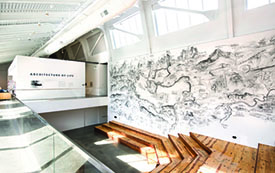 Danny Smith visits Architecture of Life, the inaugural exhibition in the new building of the University of California, Berkeley Art Museum and Pacific Film Archive. Presenting a “sweeping, cacophonous vision,” the show conceives “of architecture as the organizing principle of everything from reality to society and human relationships,” making it “a compelling examination in homemaking.” Read the full review at caa.reviews.
Danny Smith visits Architecture of Life, the inaugural exhibition in the new building of the University of California, Berkeley Art Museum and Pacific Film Archive. Presenting a “sweeping, cacophonous vision,” the show conceives “of architecture as the organizing principle of everything from reality to society and human relationships,” making it “a compelling examination in homemaking.” Read the full review at caa.reviews.
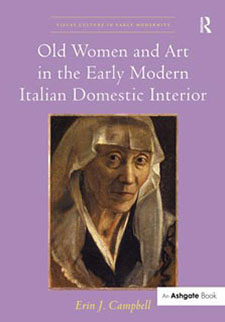 Kimberly L. Dennis reads Old Women and Art in the Early Modern Italian Domestic Interior by Erin J. Campbell. The author “describes a proliferation of portraits of old women in the second half of the sixteenth century in northern Italy,” arguing “that these portraits served to remind viewers of the duty of old women to model familial and civic virtue.” Read the full review at caa.reviews.
Kimberly L. Dennis reads Old Women and Art in the Early Modern Italian Domestic Interior by Erin J. Campbell. The author “describes a proliferation of portraits of old women in the second half of the sixteenth century in northern Italy,” arguing “that these portraits served to remind viewers of the duty of old women to model familial and civic virtue.” Read the full review at caa.reviews.
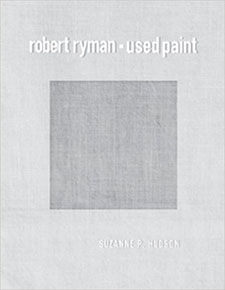 Dustin London reviews Suzanne P. Hudson’s Robert Ryman: Used Paint. The volume “documents the development of Ryman’s art from the early 1950s to the turn of the century” and “provides a thorough description and analysis of the variety of his approaches to painting.” Hudson “writes with eloquence and perspicuity to bring Ryman’s work to a wider audience on its own terms.” Read the full review at caa.reviews.
Dustin London reviews Suzanne P. Hudson’s Robert Ryman: Used Paint. The volume “documents the development of Ryman’s art from the early 1950s to the turn of the century” and “provides a thorough description and analysis of the variety of his approaches to painting.” Hudson “writes with eloquence and perspicuity to bring Ryman’s work to a wider audience on its own terms.” Read the full review at caa.reviews.
Thank You For CAA2017
posted by admin — February 21, 2017
Thank you everyone who made this 2017 Annual Conference in New York a lively and vibrant event. The CAA staff, board, and myCAA helpers spoke with as many attendees as we could and attended as many sessions as we could. From what we heard at the conference, through official feedback channels and informal hallway conversations, people had a good time and learned. Attendees felt challenged and invigorated by the discussions. That is all we can ask. We received positive responses to our themes of inclusion, problem solving, and feedback. The shortened ninety-minute sessions were welcomed and attendees shared that the addition of more sessions on diversity and current politics gave the conference a much-needed vitality. For our attendees, we hope that myCAA collectively felt like ourCAA.
We look forward to carrying this energy and momentum into the 2018 Annual Conference in Los Angeles, February 21-24, 2018.
There will be many, many more images to come in the next few weeks. But here are a few that we wanted to share right away.
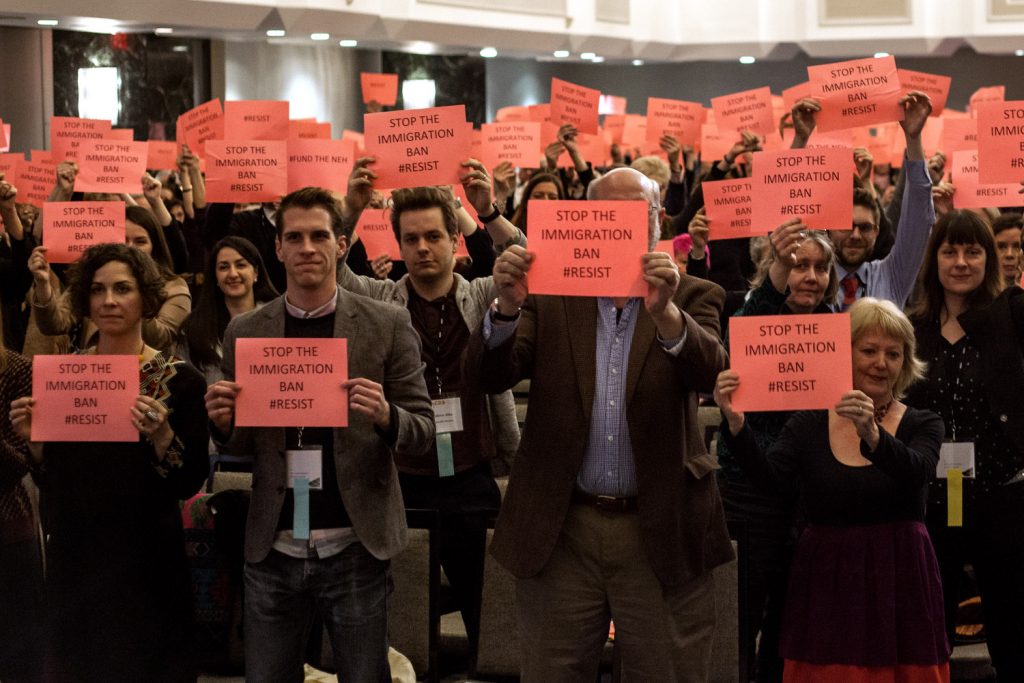
Convocation as an Act of Protest
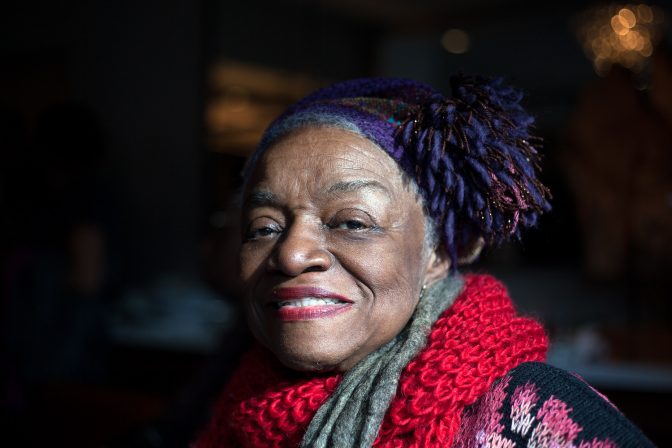
Distinguished Artist for Lifetime Achievement, Faith Ringgold
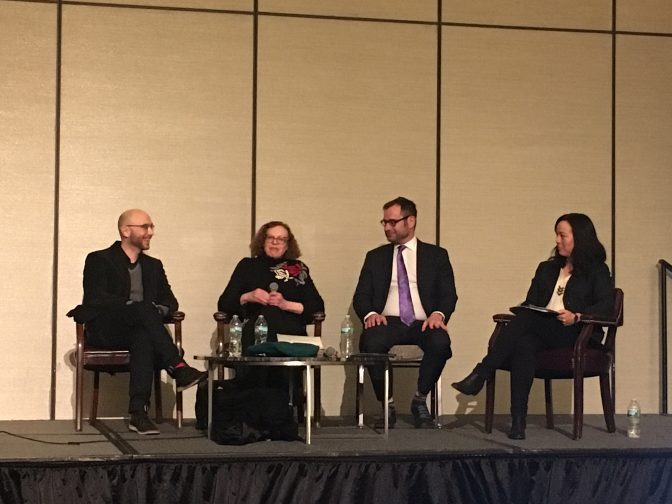
Distinguished Scholar, Kaja Silverman
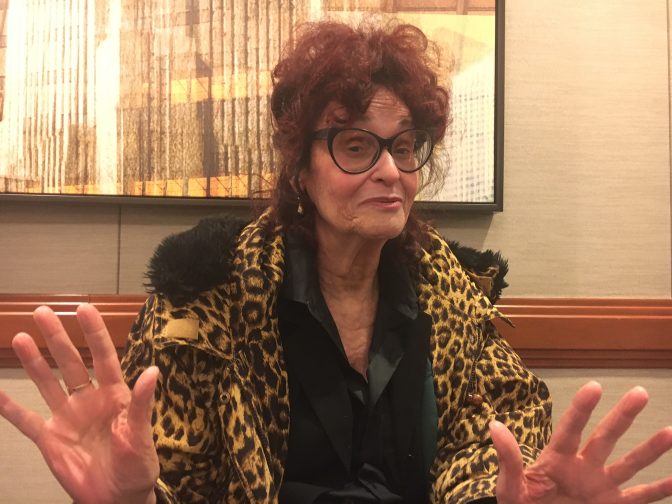
Artist Judith Bernstein, a discussant in the Distinguished Artist Interviews
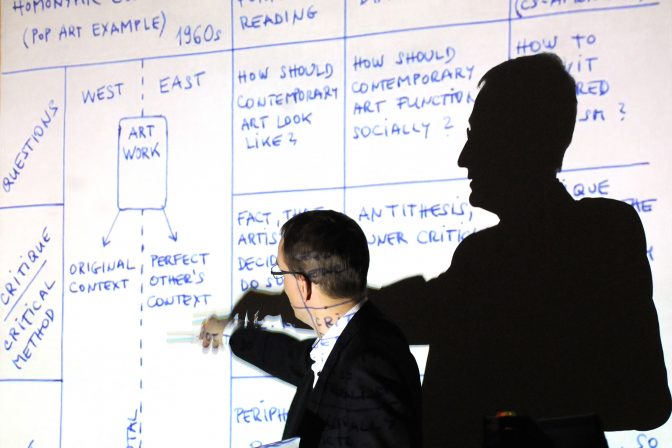
CAA-Getty International Fellow, Richard Gregor
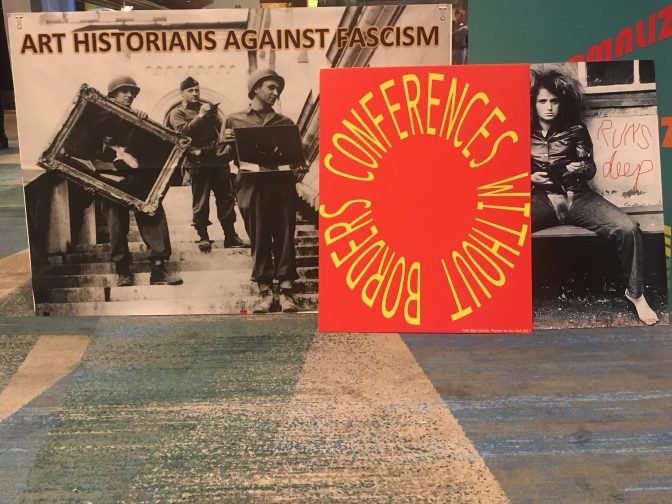
Impromptu Protest Posters
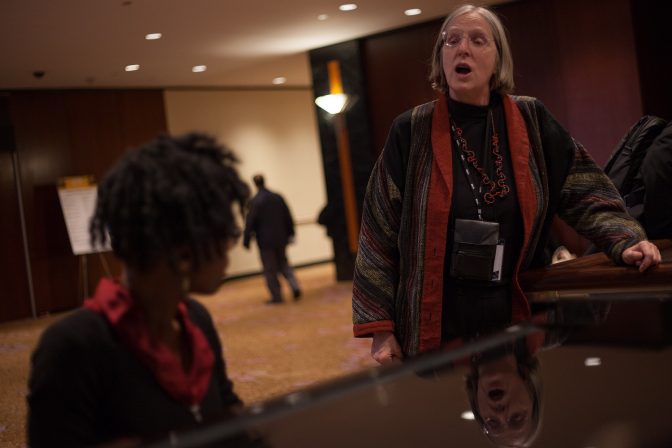
Attendees Singing “We Shall Overcome” Together
Results from the 2017 Board Election
posted by admin — February 17, 2017
 CAA announced the results of the 2017 Board of Directors election on Friday, February 17, 2017, during the second half of the Annual Business Meeting. The four new directors are:
CAA announced the results of the 2017 Board of Directors election on Friday, February 17, 2017, during the second half of the Annual Business Meeting. The four new directors are:
They will take office at the next board meeting, in May 2017, and serve four-year terms. Thank you for voting!
The Art Bulletin Seeks Reviews Editor
posted by admin — February 14, 2017
The Art Bulletin Editorial Board invites nominations and self-nominations for the position of reviews editor for the term July 1, 2018–June 30, 2021 (with service as incoming reviews editor designate 2017–18). The Art Bulletin, published quarterly by CAA, features leading scholarship in the English language in all aspects of art history as practiced in the academy, museums, and other institutions.
Candidates should be art scholars with stature in the field and experience in editing book and/or exhibition reviews; institutional affiliation is not required. Candidates should be published authors of at least one book.
The reviews editor is responsible for commissioning all book and exhibition reviews in The Art Bulletin. He or she selects books and exhibitions for review, commissions reviewers, and determines the appropriate length and character of reviews. The reviews editor also works with authors and CAA’s editorial director in the development and preparation of review manuscripts for publication. He or she is expected to keep abreast of newly published and important books and recent exhibitions in the fields of art history, criticism, theory, visual studies, and museum publishing. This is a three-year term, which includes membership on the Art Bulletin Editorial Board.
The reviews editor attends the three annual meetings of the Art Bulletin Editorial Board—held in the spring and fall by teleconference or in New York, and in February at the CAA Annual Conference—and submits an annual report to CAA’s Board of Directors. CAA may reimburse the reviews editor for travel and lodging expenses for the meetings in New York in accordance with its travel policy, but he or she pays these expenses to attend the annual conference.
Candidates must be current CAA members in good standing and should not be serving on the editorial board of a competitive journal or on another CAA editorial board or committee. CAA encourages applications from colleagues who will contribute to the diversity of perspectives on the Art Bulletin Editorial Board and who will engage actively with conversations about the discipline’s engagements with differences of culture, religion, nationality, race, gender, sexuality, and access. Nominators should ascertain their nominee’s willingness to serve before submitting a name; self-nominations are also welcome. Please send a statement describing your interest in and qualifications for appointment, CV, and at least one letter of recommendation to: Art Bulletin Reviews Editor Search, College Art Association, 50 Broadway, 21st Floor, New York, NY 10004; or email the documents or inquiries to Joe Hannan, CAA editorial director. Deadline: Monday, April 3, 2017. Finalists will be interviewed on the afternoon of Friday, May 5, in New York.



